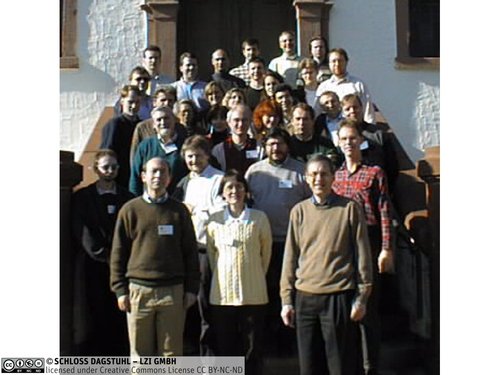Dagstuhl-Seminar 98071
Information Systems as Reactive Systems
( 16. Feb – 20. Feb, 1998 )
Permalink
Organisatoren
- H.-D. Ehrich (Braunschweig)
- J. Meseguer (SRI, Menlo Park)
- U. Goltz (Hildesheim)
Kontakt
Background
The specification, development and use of distributed information systems is an important research area with many practical applications. Examples for existing such systems are those owned by banks, airlines or governments. Moreover, the explosive growth of the Internet is evidence that a global information structure is developing, and expansion in the use of large distributed information systems can be predicted.
Information systems are reactive systems. Unlike transformational systems---that is, systems whose function is to transform some inputs into output results---reactive systems have an unlimited number of interactions with their environment. Basic notions of program correctness do not apply, and techniques for designing transformational systems do not easily carry over to reactive systems.
Non-distributed reactive systems, like conventional operating and database systems, are not easy to design, implement and restructure, a lot remains to be done to develop helpful high-level concepts, features, languages, methods and tools. However, existing products can already cope successfully with reasonably complex systems in practice. Formal methods from logic, algebra and process theory have been successfully applied, for instance in query and transaction processing, but they are not in general standard engineering practice yet.
Distributed reactive systems are still an order of magnitude more complex and difficult to specify, analyse, implement and reconfigure. They are not well understood, and methods for designing, implementing and reengineering them have not yet reached a level of mature and sound engineering practice.
Goals
A great challenge is to cope with concurrency, synchronisation, and communication at an appropriate level of abstraction. Process theory provides useful theoretical concepts for concurrency and interaction. But those providing high level declarative specification concepts, like temporal logic, tend to be sequential in nature, while those capable of expressing full concurrency, like Petri nets, tend to be operational: the level of abstraction is low. A possible approach is to adopt concepts from process algebras which provide compositional system descriptions and formalise dynamic behaviour. However, many questions then arise. These questions have been a central issue of this seminar.
- H.-D. Ehrich (Braunschweig)
- J. Meseguer (SRI, Menlo Park)
- U. Goltz (Hildesheim)
Verwandte Seminare
- Dagstuhl-Seminar 00081: Specification of Distributed Information Systems (2000-02-20 - 2000-02-25) (Details)


